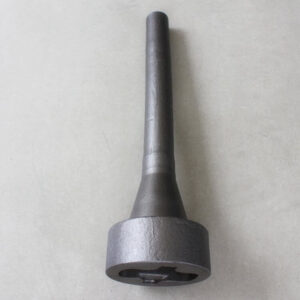Open Die Forgings
What Are Open Die Forgings?
Open die forgings, also known as free forgings, are a forging process where the workpiece is shaped between multiple flat or simple contoured dies that do not fully enclose the material. The hammer or press delivers blows or pressure, and the operator manipulates the workpiece to achieve the desired shape and dimensions. This method is ideal for producing large, simple-shaped components.

Key Characteristics of Open Die Forgings
Superior Strength & Toughness: The forging process refines the metal’s grain structure, resulting in improved mechanical properties, impact resistance, and fatigue strength compared to castings or fabricated parts.
Material Savings & Cost-Effectiveness: It is well-suited for small-batch or single-piece production of large components, offering significant cost savings over other methods for such parts and minimizing material waste.。
Design Flexibility: The process can create a wide range of shapes, from simple shafts and blocks to more complex geometries, without the need for expensive dedicated closed dies.
Large Part Capability: Open die forging is capable of producing extremely large and heavy components that are impossible or too costly to make with closed die forging.

Common Industries and Forged Parts
Open die forgings are critical in many heavy industries. Common examples include:
Power Generation: Turbine shafts, generator rotors, valve bodies, pressure vessel cylinders.
Oil & Gas: Drill pipe tool joints, wellhead equipment, mandrels, large flanges.
Aerospace & Defense: Landing gear components, engine mounts, structural airframe parts.。
Marine & Shipbuilding: Propeller shafts, rudder stocks, anchor chains.
General Engineering: Rolls for steel mills, large gears, hydraulic cylinders, connecting rods.
Common Materials for Open Die Forgings
We forge a wide variety of ferrous and non-ferrous metals to meet diverse application needs:
Carbon Steel: Low, medium, and high carbon grades.
Alloy Steel: Chromium, nickel, molybdenum, and other alloying elements for enhanced properties.
Stainless Steel: Austenitic (e.g., 304, 316), Martensitic (e.g., 410, 420) grades.
Titanium Alloys: For high strength-to-weight ratio and corrosion resistance.
Aluminum Alloys: For lightweight applications.
Copper Alloys: For superior conductivity and corrosion resistance.
Benefits of Choosing Our Open Die Forgings
Custom Manufacturing: We produce open die forgings precisely according to your technical drawings and specifications.
Heavy Press Capacity: Our powerful 2000-ton press enables us to forge large, high-integrity components that meet demanding strength requirements.
Improved Internal Quality: The forging process compacts the metal, eliminating internal voids and porosity for a more reliable part.
Versatility: Capable of handling a wide range of part sizes, weights, and material grades.
Expert Technical Support: Our experienced team provides support from material selection to final inspection.
